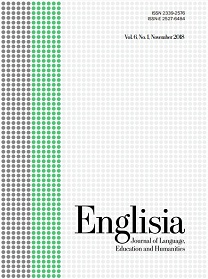Translating German philosophy into English: The case of Martin Heidegger
DOI:
https://doi.org/10.22373/ej.v8i1.7287Keywords:
authenticity, Expressionism, hermeneutics, language, rationalisation, translationAbstract
Language endangerment and language loss have become of focal interest for linguists and cultural anthropologists who bemoan the loss of linguistic diversity. The coinage of the term “linguicide” indicates the inherent problem that is related to mondialisation, universalization, and urbanization, which in itself is a highly controversial subject. The recent discoveries of Martin Heidegger’s black notebooks cast a new perspective on his work, revealing his revulsion at universalist ideologies and his antimodernism – and, most fatefully, his antisemitism: Jews who are to him the incarnation of rootlessness, distance from the soil, and thus subversion. Heidegger was born in a rural provincial German – and for many remained so, walking in the countryside, hating TV, airplanes, pop music, and processed food that all conspire to distract us from the basic wondrous nature of Being, overwhelming us with information, killing silence, and never leaving us alone, and thus keep us away from the confrontation with “das Nichts” (the Nothing), which lies on the other side of Being, that is, however, unknown to the chatter (das Gerede), which can be perceived in the newspapers, on TV and in the cities Heidegger hated to spend time in. Although he was a Nazi to the end, this does not mean that nothing can be learned from him or problems connected to his work. This library research deals with the complexity of translating this German philosopher into the English language. It draws not only on typical examples from Heidegger’s path-breaking philosophical work Sein und Zeit and presents attempts at translating it, but also points out their shortcomings and drawbacks. Additionally, it presents solutions to the problems that emerge from Heidegger’s idiosyncratic language. Generally speaking, it reveals the almost unbridgeable language barriers that can only be overcome at the expense of depth and authenticity. Homogenization can be seen as a way of leveling down ideas and concepts that end in language death.
Downloads
References
Cohen, G. A. (2013). Finding oneself in the other. New Jersey, NJ: Princeton University Press.
Dahlstrom, D. O. (2013). The Heidegger dictionary. London, UK: Bloomsbury Academic.
Gadamer, Hans-Georg. (1995). Hermeneutik im rückblick. Tübingen, Germany: J.C. B.Mohr.
Groth, M. (2017). Translating Heidegger. Toronto, Canada: University of Toronto Press.
Heidegger, M. (1) Einführung in die metaphysik, Gesamtausgabe, II. Abteilung: Vorlesungen 1923-1944, Band 40, p. 54 (Introduction into Metaphysics). II. Division: Lectures 1923-1944, Vol. 40.
Heidegger, M. (2) (1958). Einführung in die metaphysik. Tübingen, Germany: Max Niemeyer Verlag.
Kisiel, T. (2002). Heidegger’s way of thought: Critical and interpretive signposts. London, UK: Continuum.
Macquarrie, J., & Robinson, E. (1962). Being and time. Oxford, UK: Blackwell Publishers.
Maly, K. (2000). Translating Heidegger’s works into English: The history and the possibility. Heidegger Studies, 16, 115-138.
Peters, M. A. (2014). Anxieties of knowing. Educational Philosophy and Theory, 46(10), 1093-1097.
Raffoul, F., & Nelson, E. S. (Eds). (2013). The Bloomsbury companion to Heidegger. New York: Bloomsbury Academic.
Sarkar, S. (1992). Rudolf Carnap, 1891-1970: The editor’s introduction. Synthese, 93(1/2), 1-14.
Schrader, S. A., & Buzon, M. R. (2017). Everyday life after collapse: A Bioarchaeological Examination of Entheseal Change and Accidental Injury in Postcolonial Nubia. Bioarchaelogy International, 1(1-2), 19-34.
Shariatinia, Z. (2015). Heidegger’s ideas about death. Pacific Science Review B: Humanities and Social Sciences, 1(2), 92-97.
Wheeler, M. (2020). Martin Heidegger. The Stanford Encyclopedia of Philosophy, Retrieved from https://plato.stanford.edu/archives/fall2020/entries/heidegger/.
Wolfson, E. R. (2019): Heidegger and kabbalah: Hidden gnosis and the path of poiēsis. Bloomington, IN: Indiana University Press.
Downloads
Published
Issue
Section
License
Proposed Policy for Journals That Offer Open Access
Authors who publish with Englisia journal agree to the following terms:
- Authors retain copyright and grant the journal right of first publication with the work simultaneously licensed under a Creative Commons Attribution License that allows others to share the work with an acknowledgement of the work's authorship and initial publication in this journal.
- Authors are able to enter into separate, additional contractual arrangements for the non-exclusive distribution of the journal's published version of the work (e.g., post it to an institutional repository or publish it in a book), with an acknowledgement of its initial publication in this journal.
- Authors are permitted and encouraged to post their work online (e.g., in institutional repositories or on their website) prior to and during the submission process, as it can lead to productive exchanges, as well as earlier and greater citation of published work (See The Effect of Open Access).









